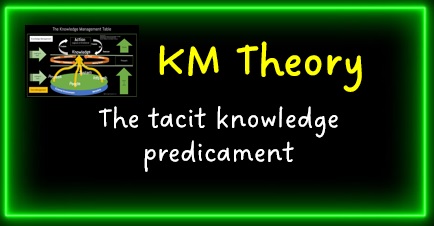Digging into the “Trust” domain on an academic level, I found this published Paper:
Trust and tacit knowledge
sharing and use.[1]
Here an extract from the publication:
(Keep in mind this does not show the whole
context of the paper. I suggest you read the whole paper. I’m sure there will
be more research papers on this topic, please share to add to this argument and
opinion.)
“The effective management of tacit knowledge
– the unwritten memory of the firm – is
essential to the success of modern firms.
Tacit knowledge is not readily captured or stored
by information technology systems. Increasing
investment in information technology will not
translate into better transfer and use or
tacit knowledge because individuals decide whether
they will share tacit knowledge and
individuals decide whether they will use tacit knowledge.” [1]
All the credit to J. Scott Holste and Dail
Fields for doing this research. [1]
So, what now? Is information technology then may be able to assist with the transferring of tacit knowledge? And here the argument starts. In my opinion yes, to a certain extent, but please feel free to send your thoughts as well. The definition of “Trust” is really complicated, never mind trying to explain how trust is build or destroyed. Knowledge management is all about people, to gain tacit knowledge from other people you will need to know where to start looking. Narrow it down to organizations and it becomes even more difficult. Where do you start?
The first split should be between the persons private life (personal and social knowledge) and the persons organization knowledge. Jip, you are thinking it, Enterprise Knowledge Graphs? Is it the answer? No, not for tacit knowledge, it is not people based but information based.
Maybe Customer 360 graphs? No, this is more a way of having “Master” data for an entity outside your organization showing explicit information.
Surely employee experience platforms will do the job? No, this is not a tacit sharing platform, it will supply some relevant information but stays an information repository.
The way I see it is that to leave any
technology out of the equation when starting a Knowledge Management initiative.
It starts and ends with People. Rather create an environment where people can
share tacit knowledge. Determine people with the same professional interests to
start to talk to each other in the organization. (Here Human Resources needs to
gather the information as a start.) This should be small groups, get everybody talking
with each other to build trust. When trust exists then people will start to
share tacit knowledge. Once strong “knowledge pods” exist start connecting the
dots. Here you can start to look at technology, use graph technologies to
connect the “knowledge pods”, on a very high level to enable all “knowledge pods”
to see what “the other people are talking about”. This information should be trusted and easily accessible
for all the employees no matter where in the world the person resides, example
a web page. Comfort and easy of use are the key with added effective search capabilities.
Please let me know what your thoughts are?
[1] Trust and tacit knowledge sharing and use
Holste, J Scott; Fields, Dail. Journal of Knowledge Management; Kempston Vol. 14, Iss. 1, (2010): 135

